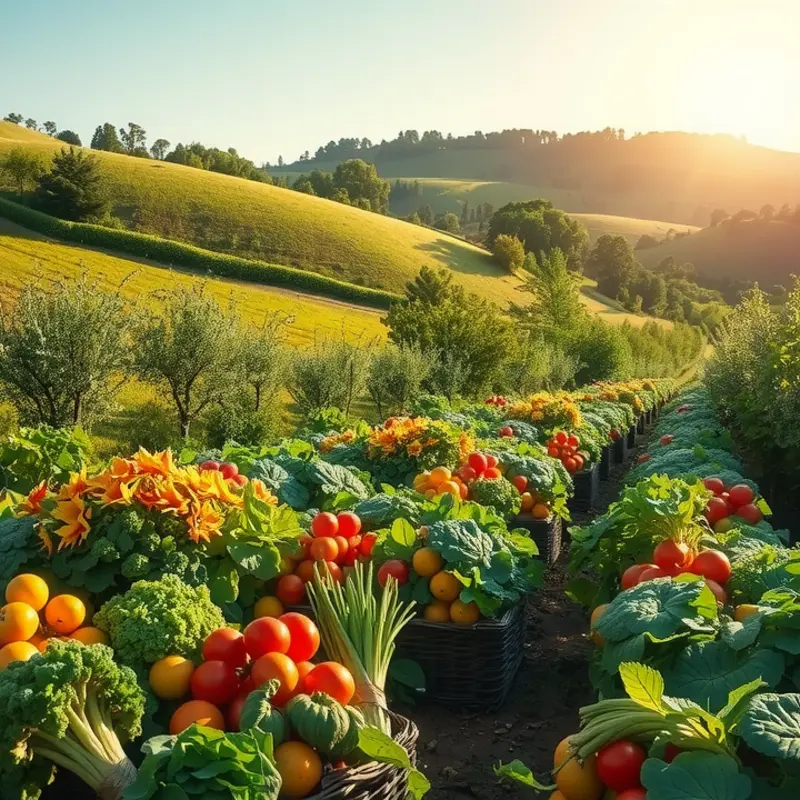Supporting local farmers not only strengthens community ties but also promotes sustainable practices that benefit our environment. By choosing to buy from local producers, you reduce the carbon footprint associated with transporting food over long distances, while simultaneously fostering biodiversity and preserving open spaces. Engaging with local farms allows you to make informed choices about your food consumption, leading to healthier living and environmental stewardship. Let’s explore practical ways to support local farmers and integrate eco-friendly food choices into your lifestyle.
The Environmental Benefits of Backyard Bounty

Supporting local farmers is not just a choice but a powerful step towards sustainability. By focusing on local agriculture, we contribute to preserving land, reducing emissions, and promoting biodiversity. These are essential factors in achieving a greener future.
Local farming practices often employ techniques that are gentler on the environment. Smallholder farms tend to avoid monoculture, a practice where a single crop is grown extensively over a large area, leading to biodiversity loss. Instead, local farmers typically engage in polyculture, where multiple crops grow in harmony, supporting a variety of species. This method improves soil health and reduces the need for chemical interventions, ultimately preserving the ecosystem.
When it comes to carbon emissions, transportation of food plays a critical role. By purchasing locally, we cut down on the food miles associated with bringing produce to our plates. This reduction in transport lessens the amount of fossil fuels burned, cutting greenhouse gas emissions significantly. Additionally, local farmers often utilize sustainable practices, such as crop rotation and organic farming, which further reduce their carbon footprint.
Embracing seasonal eating not only synchronizes with nature’s cycles but also brings a host of environmental and personal benefits. Consuming what is in season reduces the demand for shipping fruits and vegetables from other regions or countries. This approach encourages a closer tie to our local ecosystems and empowers farmers to grow diverse crops throughout the year.
Moreover, eating seasonally and locally supports the reduction of food waste. Produce grown closer to home can arrive fresher and quicker, lasting longer and reducing the chance of spoilage before consumption. This practice ensures consumers get the most of their nutrition, as nutrients are highest when produce is fresh.
To further optimize sustainability, shoppers can consider low-waste cooking methods, which complement the benefits of local produce by minimizing waste. By planning meals around what’s freshly available, the likelihood of using all parts of the produce increases, further reducing potential waste.
In summary, supporting local agriculture enables individuals to make significant environmental impacts. From preserving biodiversity to lowering carbon emissions, each choice towards local, seasonal buying contributes to the planet’s health. The ripple effect of these decisions aids in nurturing not only our personal well-being but also the broader global ecosystem.
Practical Steps to Engage with Local Farmers

Connecting with local farmers is a rewarding step towards sustainable living. Begin by visiting your nearby farmers’ markets. These markets not only offer fresh produce but also provide a platform to meet the growers. Engage in conversations, ask about their farming methods, and express interest in sustainable practices. Building these relationships can open doors to understanding and supporting eco-friendly agriculture.
Consider joining a Community-Supported Agriculture (CSA) program. By subscribing to a CSA, you commit to purchasing seasonal produce directly from a local farm. This arrangement supports farmers financially, allowing them to plan their crops with confidence. The produce is often delivered to a central location or directly to your doorstep. Participating in a CSA is a direct way to reduce the carbon footprint associated with food transport and packaging.
Farm-to-table restaurants are another excellent way to support local agricultural practices. These establishments prioritize sourcing ingredients from nearby farms, ensuring freshness and reducing transportation emissions. When dining out, choose restaurants that showcase locally sourced menus. This choice encourages other businesses to embrace similar sustainable practices, creating a ripple effect throughout the community.
Building relationships with local producers is crucial. Follow them on social media to stay updated on their offerings and events. Engage with their content and share your experiences with their products. Inviting friends and family to join you in visiting markets or trying a farm-to-table restaurant increases support for local farms. Word-of-mouth remains a powerful tool in boosting a grower’s visibility in the community.
Advocating for sustainable farming is essential for a greener future. Participate in community meetings and promote discussions around local agriculture. Encourage local governments to support farmers through policy and incentives. As a consumer, choosing local and sustainably produced goods sends a message about your priorities.
Sharing your journey with others can inspire them to make eco-conscious choices as well. Host a community event featuring local produce, or start a blog detailing your experiences with local farms. These activities can invigorate a collective interest in sustainable living. For more ideas on reducing your environmental impact while cooking at home, check out this guide on low-waste cooking and prep.
Through active engagement and support, you contribute to a system that values sustainability. Your efforts can inspire a broader societal shift towards nurturing nature and creating a greener future for all.
Final words
Supporting local farmers is a crucial step towards fostering a sustainable food system that benefits our health and the environment. By choosing to buy local, we not only support our community but also embrace the practices that lead to ecological balance and nutrient-rich food options. As you adopt these eco-friendly food choices, remember that every purchase you make is a vote for the kind of world you want to help create. Let’s take active steps to nourish ourselves and the planet by connecting with local agriculture. Every small action contributes to a larger impact.








